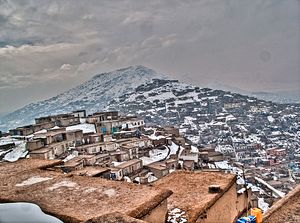The real war in Afghanistan is between the people and corrupt members of the ruling elite — in short, the kleptocrats. On March 27, the Afghan parliament summoned security officials over deteriorating security situation across the country only to show confidence in their ability to serve. This is not the first time the public officials have gotten away after brokering deals. This massive and ever powerful network of kleptocrats has jeopardized any prospects of enduring peace and economic prosperity in Afghanistan. The unprecedented level of corruption is a product of the last few decades of war and the injections of billions of dollars of aid without sufficient oversight, resulting in fractured state institutions.
Government corruption has compromised the security, economic growth prospects, and overall state cohesion in Afghanistan. Therefore, the actual battle does not start on the mountains, but the streets of Wazir Akbar Khan. For that, we need an army of professionals more than an army of soldiers. The weapon of this fight are not guns but introducing what are called unexplained wealth orders.
To cure this cancer, the Afghan government, supported by international donors, has taken many initiatives with no significant results. I emphasize asset disclosure by public officials to redress the situation, as former U.S. Supreme Court Judge Louis D. Brandeis rightly says that “publicity is justly commended as a remedy for social and industrial diseases.” Despite being constitutionally mandated, the most senior Afghan officials, including Vice President Abdul Rashid Dostom, have failed to make asset declarations and the High Office of Oversight has failed to verify information about others. The politically connected will continue to ignore calls for asset disclosure. Thus, what can be done to fight this perpetually growing network of kleptocrats?
By introducing unexplained wealth orders (UWO), those suspected of corruption will be forced to disclose the source of their assets, facilitating recovery of illicit funds. In the event of a significant or inexplicable reason for increased wealth, suspects will either explain the origin of their wealth or their assets will be forfeited. The burden of proof lies on the defendant to prove their level of income justifies their wealth. The reason why unexplained wealth orders are an ideal anti-corruption tool for Afghanistan is because it does not require significant investigative capacity on the government’s part. The onus lies on the defendant to prove their income justifies the wealth. Although the Afghan government committed to introducing this legislation in Anti-Corruption Summit of 2016, there has been no action taken since.
There are hundreds of suspected multi-million dollar mansions, mostly built on stolen land with proceeds of corruption and drug trade, in the neighborhoods of Shirpoor or Wazir Akbar Khan. Most of these villas are rented out to foreign NGOs and the property income is almost never disclosed to authorities. Meanwhile, millions of Kabulis live in slums built on the outskirts of a city lacking electricity and sanitation.
The international community is critical in implementing this reform by conditioning future funding to serious efforts in fighting kleptocrats. The government must start with major beneficiaries of the Afghan opium trade and corruption, who are fairly well-known. Key kleptocrats who have enjoyed impunity start with Dostum. He is a “known killer” amassing massive amounts of illicit wealth, which is evident from his mansions in Shirpoor, dozens of SUVs, and private bodyguards. Moreover, Ustad Atta Mohammad Noor, the de facto ruler in the north, is “immensely wealthy,” and has a stake in almost all companies registered in the region under his influence.
Fighting these kleptocrats effectively would mean the following: the government should issue the first unexplained wealth orders to these perpetrators. The international community can support the government by sanctioning these individuals in case of non-compliance. This means travel restrictions, asset seizures in foreign countries, and opening investigations through mutual legal assistance. International donors should restrict all future funding until explained wealth orders are issued and complied with.
The alternative is that we will never be able to regain the confidence of the Afghan people. We, Afghans, believe corruption is a bigger threat than insecurity. Fighting kleptocrats in good faith will heal the wounds of millions of Afghans adversely affected over many decades. The government can reinvest recovered assets in health, education and infrastructure. This will not only benefit Afghans, it will also ensure effective use of our foreign friends’ taxpayers money. On March 27, the people lost one battle, but we can win the war against kleptocrats.
Sayed Mushtaq Sadat was formerly a financial consultant with international donors helping the Afghan ministries of higher education, public health, agriculture, and commerce. He is a candidate for an MSc in Accounting, Organizations, and Institutions at The London School of Economics and Political Science (LSE). His Twitter handle is @MushtaqSadat.

































